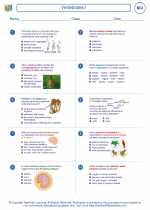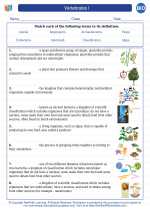Tropical Rainforests
Tropical rainforests are dense forests located in tropical regions near the equator. They are characterized by high levels of rainfall and constant high temperatures, which support a rich and diverse ecosystem. These ecosystems are home to an incredible variety of plant and animal species, many of which are found nowhere else on Earth.
Characteristics of Tropical Rainforests
- Climate: Tropical rainforests experience high levels of rainfall, usually between 80 to 400 inches per year, and consistently high temperatures, typically between 68°F and 93°F.
- Vegetation: The dense vegetation in tropical rainforests consists of tall trees, epiphytes, lianas, and a wide variety of plant species. The canopy layer is particularly dense and blocks out much of the sunlight from reaching the forest floor.
- Biodiversity: Tropical rainforests support an incredibly diverse range of plant and animal species. It is estimated that half of the world's species can be found in tropical rainforests.
- Soil: The soil in tropical rainforests is generally nutrient-poor, as heavy rainfall washes away nutrients. Most of the nutrients are found in the vegetation itself, rather than in the soil.
Importance of Tropical Rainforests
Tropical rainforests play a crucial role in maintaining the balance of the Earth's ecosystem. They are often referred to as the "lungs of the Earth" because they absorb carbon dioxide and release oxygen through the process of photosynthesis. Additionally, they are a source of many important medicines, and their biodiversity provides genetic resources for agriculture and industry.
Threats to Tropical Rainforests
Despite their importance, tropical rainforests are under threat from deforestation, primarily due to logging, agriculture, and urbanization. This has led to significant loss of habitat for many plant and animal species, as well as contributing to climate change and the loss of important ecosystem services.
Study Guide
When studying tropical rainforests, it is important to focus on the following key areas:
- Understand the climate and geographical distribution of tropical rainforests.
- Learn about the unique flora and fauna found in tropical rainforests.
- Explore the ecological importance of tropical rainforests and the services they provide to the planet.
- Examine the human impacts and threats to tropical rainforests, and potential conservation efforts.
By understanding these key areas, students can gain a comprehensive understanding of the importance of tropical rainforests and the need for their conservation.
.◂Biology Worksheets and Study Guides High School. Vertebrates I

 Worksheet/Answer key
Worksheet/Answer key
 Worksheet/Answer key
Worksheet/Answer key
 Vocabulary/Answer key
Vocabulary/Answer key
 Vocabulary/Answer key
Vocabulary/Answer key
 Vocabulary/Answer key
Vocabulary/Answer key
